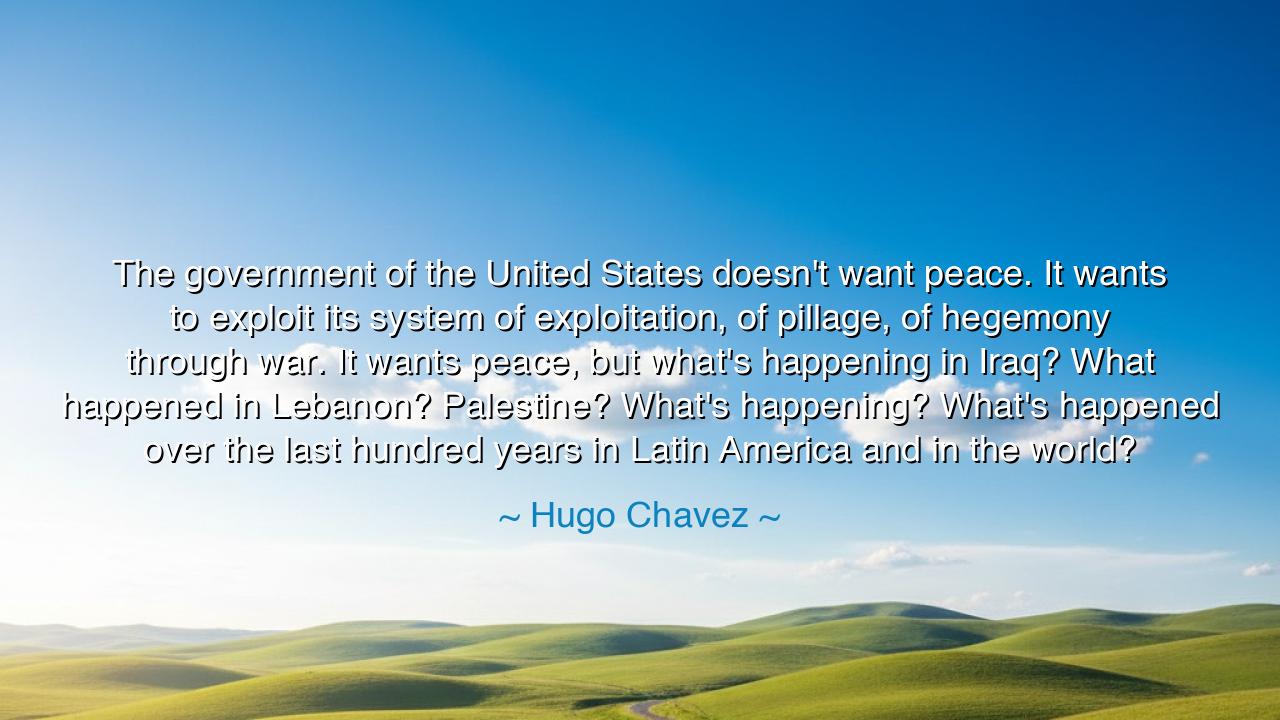
The government of the United States doesn't want peace. It wants
The government of the United States doesn't want peace. It wants to exploit its system of exploitation, of pillage, of hegemony through war. It wants peace, but what's happening in Iraq? What happened in Lebanon? Palestine? What's happening? What's happened over the last hundred years in Latin America and in the world?






In the days of the old empires, when men spoke not with the cold restraint of calculation but with the fire of conviction, such words as those uttered by Hugo Chávez would have resounded like thunder across the mountains and seas. His declaration — that the government of the United States does not want peace, but seeks to maintain its system of exploitation, pillage, and hegemony through war — is not merely a criticism of one nation, but a lamentation for the fate of humanity itself. For when the mighty forget justice, and when the strong drink from the cup of greed until they can no longer taste mercy, then the earth trembles beneath the weight of their sins.
In these words lies the echo of centuries — of colonial conquest, of wars fought for profit, of the silent suffering of peoples whose lands were divided by strangers and whose resources were taken in the name of freedom. Chávez spoke not as an enemy of a people, but as a prophet warning against a system that feeds on the toil of the poor and clothes itself in righteousness while its hands drip with oil and blood. His voice rises from the same well of indignation that once gave birth to the cries of Bolívar, who saw the chains of empire fall only to be replaced by those of commerce and control.
Consider the tale of Iraq, once the cradle of civilization, where rivers of knowledge and art flowed in the ancient city of Baghdad. When the fires of war came upon it, they did not bring liberation, but ruin. The libraries that once held the wisdom of ages were reduced to ash; the streets that had seen the dawn of science and poetry became graveyards. The land that had given writing and law to the world was left broken, so that a few might profit from its oil. This is what Chávez meant when he asked, “What’s happening in Iraq?” — he was not merely questioning an event, but exposing a pattern that has repeated itself in Lebanon, Palestine, Latin America, and across the earth.
The ancients would have recognized this pattern well. For in the history of Rome, too, the same hunger for dominion consumed the spirit of the Republic until it became an Empire. Rome claimed to bring peace — Pax Romana — but that peace was the silence of conquered peoples, the stillness after their cities had burned. So too, modern empires proclaim peace, yet wage endless wars to preserve their power. The mask of civilization cannot conceal the face of greed. The laurels of democracy cannot hide the chains of hegemony.
Yet there is another side to this story — the resilience of the human spirit. In Latin America, generations of humble men and women rose up against the foreign hand that sought to shape their destiny. From the mountains of Cuba to the plains of Venezuela, they dreamed of freedom — not the freedom sold in markets, but the freedom to live with dignity. When Chávez spoke, it was as one voice among millions, declaring that true peace is not the absence of war, but the presence of justice. His words remind us that peace cannot be bought, nor can it coexist with oppression.
Let this, then, be the lesson for those who listen across the ages: that power without conscience becomes tyranny, and wealth without compassion becomes poison. No nation, no man, no empire endures forever when it builds its throne upon the suffering of others. The fate of Babylon, of Rome, of every great empire that has fallen — all stand as witnesses to this eternal truth.
And to you, the listener of these words — do not despair, but awaken. The struggle for peace begins not in the palaces of the mighty, but in the hearts of the just. Speak truth when others are silent. Defend the weak when others turn away. Refuse to be complicit in systems of exploitation and pillage. For though the world may seem ruled by the merchants of war, the dawn belongs always to those who fight for justice. Be as the river that wears down the stone — patient, relentless, and pure — until even the walls of empire must yield to the quiet force of peace.






AAdministratorAdministrator
Welcome, honored guests. Please leave a comment, we will respond soon